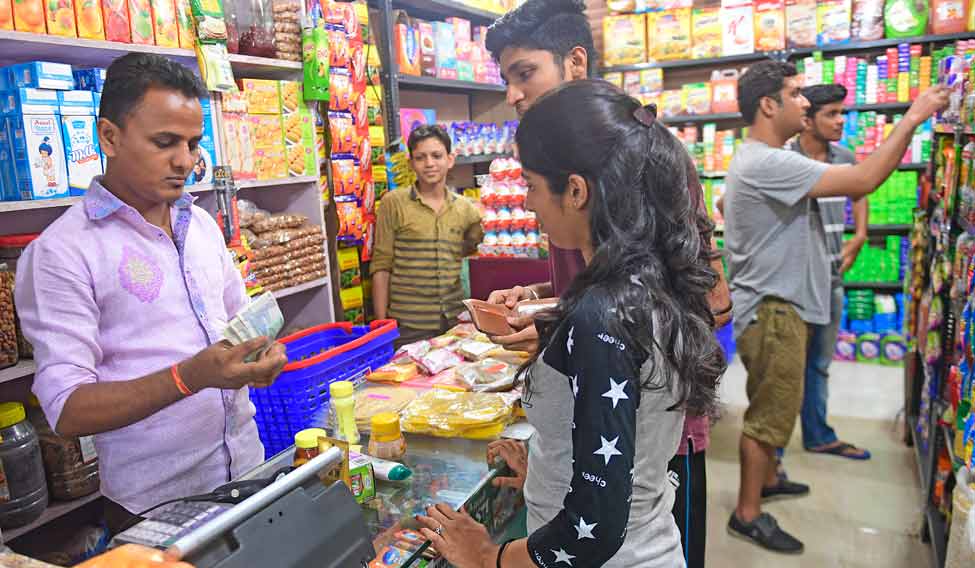The word consumer is self-explanatory and the literal meaning is "one who consumes". But, as against a customer in the market place, a consumer has a wider and broader meaning. In traditional theory, the consumer is considered to be well-informed about costs, price and quality of goods. But in the real world, things are different.
Consumer can be defined as an individual who purchases and uses products and services in contrast to manufacturers who produce the goods or services and wholesalers or retailers who distribute and sell them. This includes the user of such good or service, but not one who obtains the good for resale or commercial purposes. It covers transactions through all modes including offline, online through electronic means, teleshopping, or multi-level marketing.
Changing Indian consumer in a globalised era
When India opened its economy to the global marketplace in the early 1990s, many multinational corporations rushed in to pursue its middle-class consumers—an estimated 200 million people—only to confront low incomes, social and political conservatism, and resistance to change. It turned out that the Indian consumer was a tough one to figure out and win over.
Globalisation and liberalisation of trade and business has resulted in many products and services being available to the consumers. Growth in economy has resulted in increase in the purchasing power of the middle class, which is the largest segment of the population. This has necessitated the protection of the consumers and promotion of responsible consumer movement in the country.
Customer is king; protect the king
Several laws have been passed by the Indian government to protect consumers and uphold their rights—like the Prevention of Food Adulteration Act, 1954, The Essential Commodities Act, 1955, Bureau of Standards Act, 1986, among others. The most important one, however, is the Consumer Protection Act 1986, which is set to undergo a major revamp. The new Consumer Protection Bill, 2018, was introduced by Ram Vilas Paswan, Union minister for consumer affairs and food and public distribution, in the Lok Sabha on January 5.
Talking about the new bill, Prime Minister Narendra Modi said, “Consumer protection was in line with the government’s resolve of building a new India. New consumer protection act was in the making which would lay out stricter guidelines on advertisements, to ensure people are not misled. Stringent provisions have been proposed against misleading advertisements. A Central Consumer Protection Authority with executive powers will be constituted for quick remedial action. The government prioritising consumer protection is in line with our resolve of a new India. We will change it to consumer prosperity on the way ahead."
Some points to note about the new Bill, which was approved by the Cabinet in December 2017, are:
• The Bill enforces consumer rights, and provides a mechanism for redressal of complaints regarding defect in goods and deficiency in services.
• Consumer Dispute Redressal Commissions will be set up at the district, state and national levels for adjudicating consumer complaints.
• The Bill establishes a Consumer Protection Authority to investigate into consumer complaints, issue safety notices for goods and services, and pass orders for recall of goods and against misleading advertisements.
• If a consumer suffers an injury from a defect in a good, he may file a claim of product liability against the manufacturer. The consumer must establish seven conditions in order to prove such a claim.
• The Bill classifies four contract terms as 'unfair'—(1) payment of excessive security deposits; (2) disproportionate penalty for a breach; (3) unilateral termination without cause; (4) one which puts the consumer at a disadvantage.
• The Bill empowers the central government to supervise the functioning of, and issue binding directions to the district, state and national consumer dispute redressal commissions. These could affect the independence of these quasi-judicial bodies.
• The District Commission, a quasi-judicial body, may be headed by a District Magistrate, who is part of the executive. This could violate the principle of separation of powers between the judiciary and executive.
• The National Commission, headed by a judicial member and comprising at least 15 technical or judicial members, will examine complaints on questions of law. This could contradict a Supreme Court judgement that questioned the competence of such technical members.
• In order to claim product liability, a claimant must establish four kinds of defects in product, the injury caused from it, and that it belonged to the manufacturer. The claimant must also establish that the manufacturer had knowledge of such a defect. It may be argued that the conditions to establish a product liability claims are unreasonable.
• The Bill defines the product liability to include defects in goods and deficiencies in services. However, the conditions to be proven to claim product liability do not include conditions for services. It is unclear how a consumer can claim product liability for deficiency in services under the Bill.
The consumer has to be aware of his rights and play a key role. The success of consumerism is a strong function of consumer awareness and to avoid exploitation, consumer must become knowledgeable. Many constitutional provisions have been made by government to protect the consumers. There is a great need to make them aware of their rights and responsibilities.
Pushpa is Member of Parliament (Rajya Sabha). Ramaswamy is former pro-vice chancellor, APG Shimla University, Himachal Pradesh.





